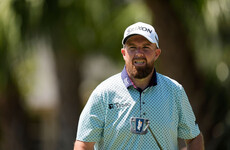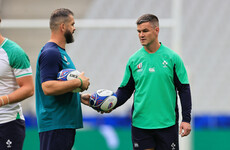HIS DAY’S WORK done, Danny Boxall took out his phone and called his father to regale him with the details of an experience that – even after 15 years – is still hard to fathom now.
“Dad,” he said, “I’ve just been taking free-kicks with David Beckham at the Bernabeu.”
Finding himself alongside one of football’s biggest superstars was an implausible scenario for a man whose most recent game at that stage was a League of Ireland debut at Tolka Park.
To understand how Boxall ended up at the home of Real Madrid, it’s necessary to trace his steps back to Crystal Palace, where he launched his career as a professional.
Aged 18, he marked his debut with a man-of-the-match performance against Norwich City near the end of the 1995-96 First Division (Championship) season.
“Playing for your local professional club is the type of thing you literally have dreams of as a kid,” he says. “Things were progressing nicely so I always believed that day would come, but it did come a bit quicker than I expected.”
It was a major milestone for a lad from Croydon who had several “Palace-mad” season ticket holders in his family. A first-team breakthrough was also a timely boost on the back of the disappointment he suffered a couple of weeks earlier.
Having fallen 4-2 behind in an FA Youth Cup semi-final away to Liverpool, Palace flipped the tie on its head when the teams went to Selhurst Park for the return leg.
The South London side opened up a 3-0 lead and were on course to advance to a decider against a West Ham United team featuring Frank Lampard and Rio Ferdinand – only for a 16-year-old named Michael Owen to conjure up a hat-trick for the visitors, who went on to claim the silverware.
Boxall played seven more senior games for Palace, one of which came in the Premier League. Prior to his appearance in the 3-1 defeat to Everton, he was also introduced to international football.
After being tipped off about a promising right-back at Crystal Palace whose grandmother was from Wexford, Ireland U21 manager Ian Evans got in touch to gauge Boxall’s interest in a call-up in March 1998.
Twenty-four hours before the senior Ireland debuts of Damien Duff and Robbie Keane in a friendly against Czech Republic in Olomouc, Boxall wore the green jersey for the first time when the U21s played the hosts 50 kilometres down the road in Drnovice.
Boxall became a regular in Evans’ side for the qualifying campaign for the 2000 European Championship, playing with the likes of Kevin Kilbane and Richard Dunne.
The soundtrack for bus journeys – supplied by goalkeeper Derek O’Connor – was initially a bit of an eye-opener for a London boy, but Boxall was soon up to speed on the Wolfe Tones’ back catalogue.
“There was no turning back for me after that first game with Ireland. The lads were so welcoming and I just got so caught up in it,” he says of a time when the senior and U21 squads were often in camp together for corresponding fixtures.
“I loved every single minute of playing for Ireland and being away with the lads. Even with guys like Roy Keane, I was conscious about even talking to him because of sounding so London, but the man was brilliant. They all were. I never felt out of place.”
As he approached his 21st birthday, game-time at Crystal Palace wasn’t presenting itself as frequently as Boxall would have liked. He moved on and found what he was looking for at Brentford, where he enjoyed some of “the happiest times” of his career.
The club were promoted to the Second Division in his first season, during which leading goalscorer Lloyd Owusu was the only player to amass more appearances than Boxall for the West London outfit.
“I was in the team regularly and I remember the fans had their own song for me too, so I knew I must have been doing something right,” he recalls. “I loved playing for Brentford. It was just a shame that injuries didn’t allow me to do it a bit more.”
Despite playing 71 times in two seasons after a 2002 switch to Bristol Rovers, Boxall’s career was nearing its end. The advice of a surgeon, who assured him that his knee couldn’t withstand the demands of the professional game for much longer, was difficult to ignore.
As a youngster at Crystal Palace, a rupture of the anterior cruciate ligament condemned him to an absence from competitive football that lasted for almost a year. Although he made a recovery, he noticed upon his return that the injury had pilfered some of the pace that was a key attribute of a full-back noted for his speed and athleticism.
To experience such a serious injury so early in his career was a devastating blow to Boxall, who then had the misfortune of encountering the same setback twice more.
“I never felt like I got back to the level I was at before the first cruciate injury. It’s different now, but back then it was still a potentially career-ending injury. When it happened a second time I knew it wasn’t good, but the third one was when I started to realise that I probably wasn’t going to be able to carry on.”
Following his departure from Bristol Rovers, Boxall intended to retire in the summer of 2004. However, when an unexpected contract offer came his way, a lack of job prospects elsewhere convinced him to give it one last shot for the sake of an income.
Roddy Collins, in his capacity as manager of Dublin City, was on a recruitment drive in the UK that brought Premier League veterans like Carlton Palmer and Efan Ekoku to the League of Ireland. Boxall was coaxed over too.
After struggling through 54 minutes of his debut – a 2-0 Premier Division defeat to Derry City – he accepted that he had no more to give and returned home to London.
“My knee was still a major problem. I was way off the pace and I couldn’t keep up with the demands anymore. Roddy quickly realised that as well. He was very good to me actually, he treated me really well, so I only wish I could have been able to repay him.”
Life as a 27-year-old former professional athlete suddenly became a bleak reality for Boxall. His future had been mapped out by football since his early teens. Without it, he endured an unsettling period as he came to terms with the loss of his sense of purpose and identity.
“It’s good nowadays that there are things in place with regards to mental health, but there was absolutely nothing like that back then. I experienced depression for a couple of years, no doubt. I was suffering quite a bit and went for counselling a couple of times.
“As a footballer, you exist in a bubble and you feel so important to everyone. When that’s taken away and you’ve got to try and find a normal job the next week, it’s hard to grasp, especially at a relatively young age. I couldn’t accept it and I found myself still telling people that I was a footballer.”
Stemming from his appearance as Mr January in a calendar released by Brentford in 2001, Boxall eventually picked up some modelling work. After linking up with some agents who knew the industry well, he then learned of a football movie that was to be filmed in the UK. Extras were required so he went along to the auditions.
The producers had drafted in Andy Ansah – a former professional player who went on to feature in Sky TV series Dream Team – as the football consultant for the film. With Ansah’s involvement working in Boxall’s favour, he was hired for a role in ‘Goal! The Dream Begins’.
“I had no idea what I was walking into. There must’ve been about a hundred blokes there trying to be selected for this thing, so when I saw Andy Ansah I made a beeline to talk to him.
“I ended up telling him that I knew Lloyd Owusu, who I played with at Brentford. He’s Andy Ansah’s cousin so that didn’t do me any harm. It obviously also helped that I looked a bit like the lead actor, so everything sort of fell into place for me.”
The movie, which became a cult classic among a cohort of football fans, tells the fictional tale of Santiago Munez, a young Mexican footballer who moves to England and hits the big-time with Newcastle United.
Kuno Becker, the actor who played the role of Munez, had no background in the game, so Boxall was used as his body double for many of the football scenes.
“I didn’t really have any grasp of how big it was until we did a day of filming up in Newcastle and we met Alan Shearer. We had to do a scene on the pitch with Laurent Robert as well, and that’s when I started to realise that it was quite a big deal.
“Then they asked me to go to Hollywood for a month and I was put up in a penthouse apartment because they had to do some scenes out there. ‘Sure,’ I said. ‘No problem at all!’
“I could literally pull open my curtains and see the Hollywood sign in the hills – it was mad. I only had to do the football bits, so when they were filming the acting bits I wasn’t needed at all. That left me free to roam around and do what I wanted. An amazing experience.”
The sequel, ‘Goal II: Living The Dream’, sees Munez complete a move away from Newcastle to join Ronaldo, Zinedine Zidane and David Beckham as one of Real Madrid’s Galacticos. Again, Boxall was enlisted for the same role.
“I spent two months out in Madrid for the filming. I remember David Beckham crossing the ball for me at the Bernabeu. I was telling my dad: ‘I’ve made it to the Bernabeu!’
“A lot of people there were encouraging me to get into doing more of it, a bit of acting or whatever, but I’m just not that way. I just wasn’t confident enough – at least not back then – to put myself forward for something like that.”
His film career went no further, but Boxall did return to the pitch – albeit at a level much lower than what he had been accustomed to. An ostenil injection relieved some of the pain around his knee by lubricating the joint, which allowed him to move freely enough to play a couple of seasons of amateur football.
His displays attracted the attention of Sutton United, who were keen to make the leap from the Conference to the Football League. Tempted by the offer, Boxall gave it consideration until his father prudently intervened.
“He basically said, ‘what do you think you’re doing trying to get back into the Football League, you retired for a reason’ – and he was right. Turning it down was the only option.”
By then, Boxall had already established his own facilities management company based in London. Thirteen years later, it continues to provide him with a good living.
He has gradually made peace with being forced into premature retirement too. While insisting that his career “feels like it was taken away” by the injuries he sustained, Boxall admits that his cause wasn’t helped by his lifestyle as a young adult.
“Stay out of nightclubs and behave myself!” he says, when asked what he’d do differently if given the opportunity to go back in time and start afresh.
“I’ve seen so many players – and I’ll give you an example of one you’ll know, Stephen Hunt – who lived life the right way and got the most out of their careers. I’m sure it would have been a benefit to me, especially with the injuries, if I had done the same.
“The more we’re finding out nowadays about sports science and nutrition, the more I realise that I wasn’t giving my body much of a chance by going out and drinking.
“Then again, my great-grandfather – who played for QPR and Chelsea – retired with knee injuries too and my brother had a knee injury as well. Knee injuries can be genetic so maybe there was a weakness there anyway, I don’t know.
“For a while it was very painful living with the regret that I never really fulfilled my potential. I’m not suggesting for a minute that I was guaranteed to be a Premier League player, but I would like to think that I could maybe have been good enough to stay in or around it at the lower level.
“I never found out how good I could have been because I lost a bit of what I had at quite a young age due to injury. I suppose that’s something that will always be with me, but I’ve learned to live with it now.
“Mostly I’m just satisfied to have even made it at all. I can only imagine how many lads would give absolutely anything to get to the level I did. That is something I’m always grateful for.”















After my comments on the journal last night, I’d like to say I feel I went a bit over the top with a number of people regarding the Irish team selection. I felt my comments were judge-mental and rude and for that I’d like to take this chance to
apologize,
To absolutely NOBODY. All you fan boys can keep being salty. Farrell has picked burns as the main kicker who nearly missed a kick in front of the posts on Sunday. Nothing even has to be said for Keith Earls. Absolutely shocking team.
@Dave: Johnny missed touch last week too and on many occasions in the past, it happens. I believe Earls has a proven record at test level. Still one of the fastest in the squad, great in the air and defensively sound. Whereas you’re track record shows something far less desirable
@Dave: t
@Dave: that’s really clever what you did there! I was hooked, so excited about this apology from some random man on the internet, but then you totally flipped it!! So clever. Well done!!
@Dave: you must be feeling a little lonely over on Twitter with your 6 followers, but hopefully you’ll get a response over here to your trolling.
@Dave: Conor MacGregor called, he wants his shtick back
@Dave: come on pal, you haven’t seen your wife and kids in 3 days. Put the phone down and go downstairs
@Sam Murray: pretty sure the wife has left him
@David Nugent: pretty sure a gowl lile him never has a wife to begin with. Who’d have him?
@JarvisOFlaherterahry: ha ha
@Dave: Lol! Brilliant.
Sexton and Murray haven’t given a performece for a long time. Let’s give the new fellas a chance…
@Leonard O’mahony: nonsense, Sexton may have been a little bit off his usual outstanding self lately but hasn’t been a million miles off and Murray was poor early last year but is having one of his best seasons this time around. In saying that I’m delighted other lads are getting a chance in a big game
I’m 95% sure Sexton would of been jogging out Sunday afternoon if it wasn’t for this doctor, I’d say his wife and mum wouldn’t let him play tbh and fair enough.
@hypebeast: you’d be wrong then. I’d imagine the doctors in the Irish camp would uphold their professionalism regardless
I was deflated reading the team today. But on reflection even if we lose this will be a good thing. Hopefully the younger guys get a taste of what its like to play a proper French team. Im sure its heart over head stuff but I think this team have so much to prove and will want to win for Farrell and co especially given the doctors unprofessional comments. Casey and Byrne might come on and give a Stringer and O Gara type performance to win a close game in the dying minutes. In the words of Christopher Reeve “Once you choose hope anythings possible”
While it is never good players’ losing spots due to injury or misfortune, I am somewhat looking forward to seeing why sort of bench Ireland has ahead of the RWC2023. Sexton, Murray, O’Mahony, Earls, Healy all need to be replaced. So while I have sympathy for the injured (not for O’Mahony as he was just stupid), I am glad that these guys are getting a shot. I think the average age of the Irish squad is at least 5 years too old to be considered contenders in 2023.
@Corkonian In Dublin: you say that you “think”, I suggest you find something you’re good at instead.
We’re going to lose anyway so might as well give a few young guys a chance
Plenty of rumours whispering about Sextons field of vision being impaired. It may be time. Just saying.